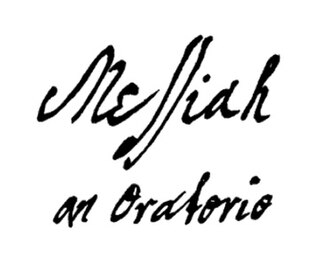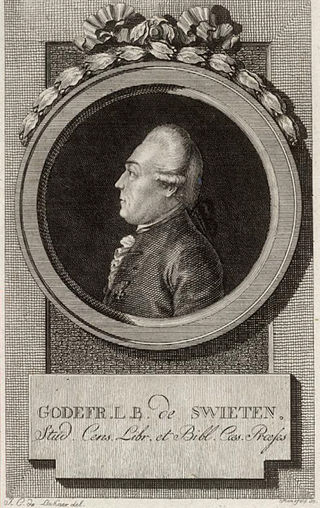
Semele is a 'musical drama', originally presented "after the manner of an oratorio", in three parts by George Frideric Handel. Based on an existing opera libretto by William Congreve, the work is an opera in all but name but was first presented in concert form at Covent Garden theatre on 10 February 1744. The story comes from Ovid's Metamorphoses and concerns Semele, mother of Bacchus. Handel also referred to the work as 'The Story of Semele'. The work contains the famous aria "Where'er you walk".

Elijah, Op. 70, MWV A 25, is an oratorio by Felix Mendelssohn depicting events in the life of the Prophet Elijah as told in the books 1 Kings and 2 Kings of the Old Testament. It premiered on 26 August 1846.

Samson is a three-act oratorio by George Frideric Handel, considered one of his finest dramatic works. It is usually performed as an oratorio in concert form, but on occasions has also been staged as an opera. The well-known arias "Let the bright Seraphim", "Total eclipse" and "Let their celestial concerts" are often performed separately in concert.

Susanna, also called Susanna and the Elders, is a narrative included in the Book of Daniel by the Catholic Church, Oriental Orthodox Churches and Eastern Orthodox Churches. It is one of the additions to Daniel, placed in the Apocrypha by Protestants, with Anabaptists, Lutherans, Anglicans and Methodists regarding it as non-canonical but useful for purposes of edification. The text is not included in the Jewish Tanakh and is not mentioned in early Jewish literature, although it does appear to have been part of the original Septuagint from the 2nd century BC, and was revised by Theodotion, a Hellenistic Jewish redactor of the Septuagint text.

Theodora is a dramatic oratorio in three acts by George Frideric Handel, set to an English libretto by Thomas Morell. The oratorio concerns the Christian martyr Theodora and her Christian-converted Roman lover, Didymus. It had its first performance at Covent Garden Theatre on 16 March 1750. Not popular with audiences in Handel's day, Theodora is now recognised as a masterpiece. It is usually given in concert, being an oratorio, but is sometimes staged.

Israel in Egypt, HWV 54, is a biblical oratorio by the composer George Frideric Handel. Most scholars believe the libretto was prepared by Charles Jennens, who also compiled the biblical texts for Handel's Messiah. It is composed entirely of selected passages from the Old Testament, mainly from Exodus and the Psalms.

Athalia is an English-language oratorio composed by George Frideric Handel to a libretto by Samuel Humphreys based on the play Athalie by Jean Racine. The work was commissioned in 1733 for the Publick Act in Oxford – a commencement ceremony of the University of Oxford, which had offered Handel an honorary doctorate. The story is based on that of the Biblical queen Athaliah. Athalia, Handel's third oratorio in English, was completed on 7 June 1733, and first performed on 10 July 1733 at the Sheldonian Theatre in Oxford. The Bee reported that the performance was "performed with the utmost Applause, and is esteemed equal to the most celebrated of that Gentleman's Performances: there were 3700 Persons present".

Judas Maccabaeus is an oratorio in three acts composed in 1746 by George Frideric Handel based on a libretto written by Thomas Morell. The oratorio was devised as a compliment to the victorious Prince William Augustus, Duke of Cumberland upon his return from the Battle of Culloden. Other catalogues of Handel's music have referred to the work as HG xxii; and HHA 1/24.

Jephtha is an oratorio (1751) by George Frideric Handel with an English language libretto by the Rev. Thomas Morell, based on the story of Jephtha in Judges and Jephthes, sive Votum (1554) by George Buchanan. Whilst writing Jephtha, Handel was increasingly troubled by his gradual loss of sight, and this proved to be his last oratorio. In the autograph score, at the end of the chorus "How dark, O Lord, are thy decrees" he wrote "Reached here on 13 February 1751, unable to go on owing to weakening of the sight of my left eye."

Hercules is a Musical Drama in three acts by George Frideric Handel, composed in July and August 1744. The English language libretto was by the Reverend Thomas Broughton, based on Sophocles's Women of Trachis and the ninth book of Ovid's Metamorphoses.

Esther is an oratorio by George Frideric Handel. It is generally acknowledged to be the first English oratorio. Handel set a libretto after the Old Testament drama by Jean Racine. The work was originally composed in 1718, but was heavily revised into a full oratorio in 1732.

Solomon, HWV 67, is an oratorio by George Frideric Handel. The anonymous libretto – currently thought to have been penned by the English Jewish poet/playwright Moses Mendes (d.1758) – is based on the biblical stories of the wise king Solomon from the First Book of Kings and the Second Book of Chronicles, with additional material from Antiquities of the Jews by ancient historian Flavius Josephus. The music was composed between 5 May and 13 June 1748, and the first performance took place on 17 March 1749, with Caterina Galli in the title role at the Covent Garden Theatre in London, where it had two further performances. Handel revived the work in 1759.

Belshazzar is an oratorio by George Frideric Handel. The libretto was by Charles Jennens, and Handel abridged it considerably. Jennens' libretto was based on the Biblical account of the fall of Babylon at the hands of Cyrus the Great and the subsequent freeing of the Jewish nation, as found in the Book of Daniel.

Joshua is an oratorio by George Frideric Handel. It was composed in a month, from 19 July 1747 to 19 August 1747, six months before the beginning of the oratorio season. Joshua is Handel's fourth oratorio based on a libretto by Thomas Morell. The oratorio premiered on 9 March 1748 at the Covent Garden Theatre, London. Joshua is based on the Biblical story of Joshua as the leader of the ancient Israelites. The story follows the Israelites from their passage over the Jordan River into Caanan and through the Battle of Jericho. The work also includes a love story elaborated from a few hints in the Biblical narrative between Caleb's daughter Achsah and Othniel, a young soldier.

Alexander Balus is an oratorio by George Frideric Handel, named after its title character, the Seleucid king Alexander Balas. The work has three acts and was written in English. The period of the story is from 150 B.C to 145 B.C. The libretto is by Thomas Morell after the biblical book of 1 Maccabees.

Messiah, the English-language oratorio composed by George Frideric Handel in 1741, is structured in three parts, listed here in tables for their musical setting and biblical sources.

Messiah, the English-language oratorio composed by George Frideric Handel in 1741, is structured in three parts. The wordbook was supplied by Charles Jennens. This article covers Part I and describes the relation of the musical setting to the text. Part I begins with the prophecy of the Messiah and his virgin birth by several prophets, namely Isaiah. His birth is still rendered in words by Isaiah, followed by the annunciation to the shepherds as the only scene from a Gospel in the oratorio, and reflections on the Messiah's deeds. Part II covers the Passion, death, resurrection, ascension, and the later spreading of the Gospel. Part III concentrates on Paul's teaching of the resurrection of the dead and Christ's glorification in heaven.

Messiah, the English-language oratorio composed by George Frideric Handel in 1741, is structured in three parts. This listing covers Part III in a table and comments on individual movements, reflecting the relation of the musical setting to the text. Part I begins with the prophecy of the Messiah and his birth, shows the annunciation to the shepherds as a scene from the Gospel of Luke, and reflects the Messiah's deeds on Earth. Part II covers the Passion, death, resurrection, ascension, and the later spreading of the Gospel. Part III concentrates on Paul's teaching of the resurrection of the dead and Christ's glorification in heaven.

Susanna and the Elders is a painting by the Venetian painter Tintoretto. Robusti, also known as Tintoretto or Il Furioso, for the energy and "fury" with which he painted, depicted both sacred and profane subjects in a period sometimes known as the Venetian “golden century”.

Der Messias, K. 572, is Wolfgang Amadeus Mozart's 1789 German-language version of Messiah, George Frideric Handel's 1741 oratorio. On the initiative of Gottfried van Swieten, Mozart adapted Handel's work for performances in Vienna.












